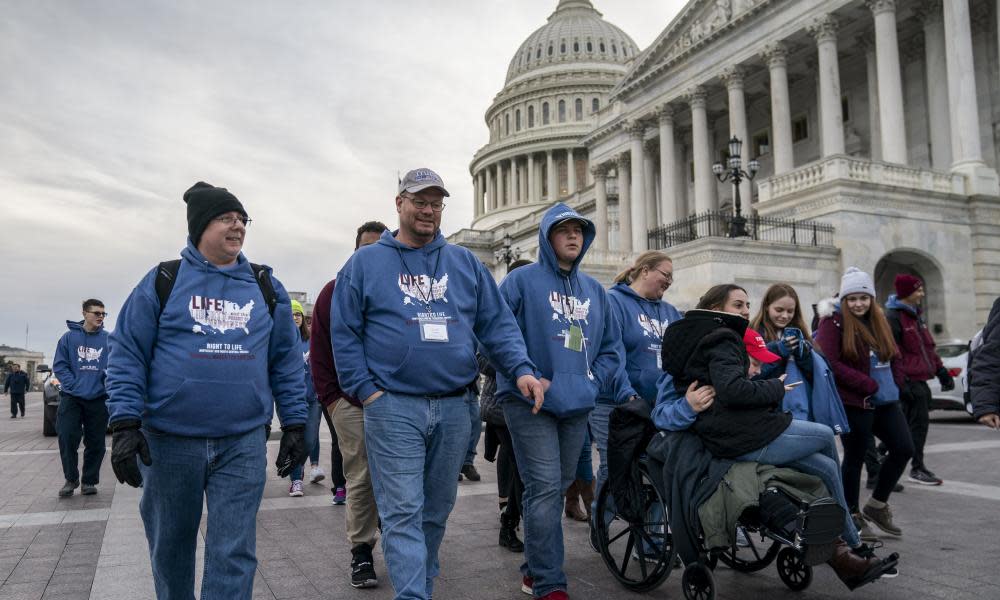Young anti-abortion marchers look forward to 'post-Roe America'

Before a crowd of teenagers, their parents and teachers, the speakers described a woman’s right to an abortion as akin to the Holocaust, slavery, a human rights violation and “the worst scourge man has ever done to man”.
This is the March for Life’s youth rally, an event designed to gear kids up before America’s largest annual anti-abortion march, due to be held in Washington DC on Friday and attended by Donald Trump, who would be the first US president to speak at the event.
“You already know the pro-life issue is the human rights issue of our day,” said Charlotte Pence Bond, Vice-President Mike Pence’s middle daughter and an anti-abortion public speaker.
People who get abortions are not evil, however, Bond told the crowd. The pro-choice movement is “mostly full of people who are really hurting”, she said, although, “I believe abortion is evil.”
This national March for Life, a protest held every yearsince the landmark US supreme court decision in Roe v Wade legalized abortion in 1973, regularly attracts 100,000 people to the Capitol, with side events such as an exposition, conference and dinners.
Many Catholic schools bus students to the March for Life as an annual field trip. Even more teenagers come with church groups or their anti-abortion parents. Together with white evangelical Protestants, they are the lifeblood of the anti-abortion movement.
A majority of Americans support legal abortion, and do not want Roe v Wade overturned, public sentiment that has changed little over the decades. Young people, in general, are even more likely to support abortion rights. A recent survey by the Public Religion Research Institute found people aged 18-24, the youngest polled, were almost 10% more likely to support abortion rights than seniors.
But young people are “not a monolith”, the survey notes. And two religious traditions bucked the trend – white mainstream Protestants and Jews. Only 51% of young, mainstream Protestants believe abortion should be legal in all or most cases, compared with 60% of seniors in this group. Among young Jews, 66% believe abortion should be legal, compared with 77% of Jewish seniors.
Young people at March for Life are bucking the trend, and they are aware, even if some said they had never been confronted with pro-choice arguments.
One teen attending the rally was 15-year-old Catherine Halbmaier. “I was sort of born into it,” said Halbmaier, who attends Catholic Faustine Academy in Irving, Texas, and was attending the rally as a field trip. She said she was not aware of ever meeting someone who was pro-choice. “I was always pro-life, but I really started to agree with it in seventh grade.”
Conversations on the sidelines of this rally sound like any other gathering of American teens. Do you have a Nintendo DS? What are you posting on Instagram? What kind of car do you want? But there are other touchstones for these kids.
One is Abby Johnson, who worked as a Planned Parenthood director in Texas until she became a darling of the anti-abortion movement. Her story was turned into the feature-length movie Unplanned. Many of the teens, like Halbmaier, saw the movie at school before they came here.
“We watched Unplanned too,” said 13-year-old Adam Jordan, a student at Immaculate Conception in Union, Missouri. “It was very, very bad,” he said. The film is graphic at times, and his school had to seek parental permission to show it.
This rally shows the permutations the anti-abortion movement has gone through. In the 1990s, aggressive anti-abortion protesters would scream at women from the sidewalks of abortion clinics. Women seeking abortions still have to walk that gauntlet, but leaders have sought to move attention away from those protesters to soften the movement’s image.
It is a love movement, they tell the kids.
At the same time, several speakers told children “don’t be afraid to offend” or to get into disagreements.
“My school’s teachers are very left,” said Christian Hepburn, a 16-year-old public school student from Springfield, Massachusetts. “I’m very Christian and open about my beliefs – I get into debates or confrontations, you could say.” His mother is an ultrasound technician and is anti-abortion.
This year is likely to focus the nation’s attention on women’s rights as the country prepares to vote in the November election. In just a couple of months a new conservative US supreme court bench of Trump’s making will hear oral arguments on an anti-abortion case in Louisiana. It is the first the court will take up on abortion.
That is when the real work will begin, Bond said, “when we see a post-Roe America, as I believe we will”.
On stage, a speaker from Texas named Angelica Park told a story about why she lost her race for class president. She had posted a video by an anti-abortion doctor on Instagram, and was met with disgust by her classmate. The football team campaigned against her. She described each abortion as a divine flash.
“The only difference between them and you is they were extinguished,” Park said. “But not tomorrow. Tomorrow we will march in their light, because we are the pro-life generation!”


